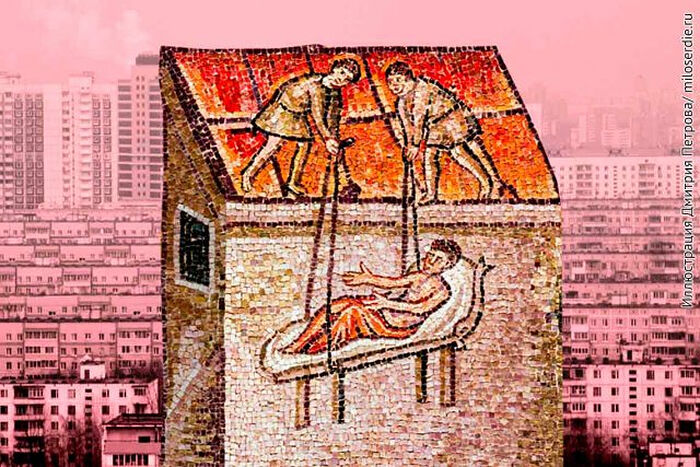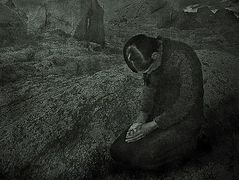“When you endlessly rebuke someone for his imperfections and keep the focus entirely on his sins, a man quits growing as a Christian.”
From our conversation with Igumen Nektary (Morozov), rector of Sts. Peter and Paul Church in Saratov and author of books on Christian topics.
Were the Gospels written for the sick, or for healthy people?
—It may seem at times that Christianity is all about healthy, strong, and psychologically stable people. A wounded man, no matter how you try to explain it, will not understand that the Father always loves and longs for you, the prodigal son. It is practically impossible for such a man to believe it if he, say, never had a father. Or, what if he had an evil father or a drinking father? What if he had a father, but he was just and merciless at the same time?
This man will likely have a neurotic view of the gospel counsels and parables since his mind is infirm, his spiritual eyesight clouded, and he doesn’t know how to see clearly. Such a man would perceive the gospel texts through the veil of his fears and only what his psychosis will allow him to understand. The Gospel truths he tries to relate to his children or friends will be distorted as well.
—It is quite obvious that the Gospel is good news for anyone but the healthy.
The texts of the Gospels offer a comprehensive answer to this question. The Lord says that it is not the healthy man who needs a doctor, but the sick. The Holy Scriptures speak with the words of Prophet Isaiah: He (Christ) Himself took our infirmities, and bore our sickness.
Quite frankly, there are no healthy people. There are the infirm who are aware of their illness or infirmity and understand their need to see a doctor. Then there are sick people who fail to recognize their infirmities and reject the need to have any treatment whatsoever.
That being said, when the Lord speaks about the sick who need a physician, He doesn’t separate those who suffer in body or in spirit. In the Gospels, we see examples of the healing of physical ailments and the ones known as mental illnesses. Needless to say that together they represent an organic whole linked as one.
When we are reading the Gospels, we see the people speaking in such a way that it would be a stretch to call them healthy. What can we say about those who reproach Christ for healing a man born blind on the Sabbath day? Or, how about those who insist that He casts out demons by Beelzebub?
We observe the profound conflict in the underlying logic of these people. We can see in them a shattered and disturbed consciousness and a self-identity that lacks clarity. In other words, the Gospels showcase everything we can witness in our lives today.
Christ came to this sick world and preached to the infirm—including to the mentally ill.
It seems there is nothing more painful and terrifying than madness, but psychiatry points out that a man, even in his sickness, retains his ability to make morally sound decisions and realize his potential. A period of acute psychosis would be the only exception.
A good friend of mine, Professor Viktor Fyodorovich Kondratiev, M.D., has long been known as a leading expert at the Serbsky Center [for psychiatry]. He was a member of the commissions called to evaluate the competency to stand trial and has worked on the Chekatilo case (a serial rapist and killer. —Trans.). He univocally asserts that man retains the capacity to make choices in any situation.
Viktor Fyodorovich told me how he used to visit his colleague and friend who was diagnosed as schizophrenic. As they were conversing, his friend kept crossing himself. Viktor Fyodorovich tactfully avoided asking his friend any questions. When he was getting ready to leave, his friend asked him whether he noticed that he was crossing himself throughout their conversation. The professor said, yes, he noticed it.
“Do you know why? A voice kept telling me to poke you in the eyes with two fingers. I did not want to poke you. So, I prayed to God to keep me from doing it.”
Admittedly, a man can turn even the Gospels into a cause of madness. However, it will still be the result of his personal choice. Religious psychopaths, who justify their crimes by words from Holy Scripture, merely find there a conditional stimulus for their own aggression.
What is so dangerous about the verb “must”?
—If the Christian message is meant for the infirm, then people today are held accountable as if they are healthy. Once during confession at a monastery, someone confessed his sensitivity to criticism and heard from a confessing priest that a “Christian should never be bitter— and that’s all.” Another sinner who confessed the sin of pride at a church in Moscow was banned from partaking of the Holy Mysteries and scolded. “How dare you!” the priest said to him.
This begs the question: Since that “unfinished” Christian is still carrying his grievances and pride, upset that he isn’t perfect, where should he go? We have somehow left the word “process” out of learning to be a Christian. We want instant results.
—I perfectly understand what you are saying. Indeed, we often see a disconnect between real life and the sermon we hear from the ambo, or the priest’s guidance during confession, or the books by modern authors offered for the enlightenment of the faithful these days.
What is the meaning of this disconnection? It is a result of the deliberate or unintentional disregard of what is a given. What kind of a given is it?
We see a man whose legs are broken and he can’t even hold on to his crutches. We come closer and ask him: “Hmm, that’s odd. Why are you lying here? A man should be walking.”
In our perception about this man, we missed a whole chunk of his life—the time needed to fuse fractured bones back together while he is in a cast. We forget that in order to recover, a man needs to take medicine to facilitate bone fusion.
We forget about the rehabilitation period as the time when he’s in a wheelchair, then he walks using crutches, and much later he learns to walk on his own.
We also forget that, despite the same diagnosis, one man can fully recover within a year, while for someone else it takes a year and a half to heal. One of them was born with strong bones and a positive disposition; he hired a expensive physical therapist, spent his recovery period in Switzerland.
Meanwhile the man had a predisposition to osteoporosis since childhood, has no money to pay for physical therapy or a vacation abroad; he is of an anxious and hypochondriac character because had an alcoholic father and a high-strung mother.
Every one of us has specific traits that affect the length of the healing process and whether we ever reach the final stage of that process. Sometimes a man who has “broken his leg,” will never be able to walk again as before, no matter how you treat him.
A man must try to do everything that ultimately depends upon him. Objectively speaking, the result could be minimal but he may have reached his peak.
If a baby was born with developmental disabilities, and his parents care for him and love him just as he is, they will rejoice at every tiny step forward and be grateful to their child for his progress.
God cares for man the same way. We know from the Gospels what sort of people gathered around Christ. They were those whom the world considered physically and morally infirm. Yet they are the Lord’s primary concern.
There is the story of Zacchaeus. We cannot tell for sure what happened to him before he met with Christ or afterward. All we see is how Zacchaeus moves forward to God.
We do not know whether Zacchaeus became “a perfect man” or not. We do know that he underwent a change and that Christ rejoices in it.
As a matter of fact, what should rejoice in? A man was an evildoer. He renounced his previous life as a wicked man. Is it really a success in the eyes of the outside world? They would say that you simply should stop acting wickedly and there is no need for any accomplishment.
It is not so if you are a Christian. The movement itself, its vector and dynamics are important for anyone aspiring to be a Christian. Faith in itself is a process. The result, or how far you are going to advance and how high you are going to climb, is a matter of secondary importance.
The danger of over-simplified Christianity
—But we don’t often hear such explanations. More often than not, people hear a call to “perfection” and it leaves them on the verge of a nervous breakdown because, “You should, but you are not always able to”. As a result, instead of humility, they reach a condition of never-ending strain, sadness, and eternal “sinfulness.”
—Our inability to see things in their true light, to see a real man with his limitations, instead of seeing some kind of one-dimensional “Christian” who must do this and that, is a problem for our church and its pastors.
When a person feels that in his priest’s eyes he is a one-dimensional stick figure of a Christian, he begins to think of Christianity as something he belongs to, or so it seems, yet it remains beyond his reach.
It oddly leads him to the realization that he is a stranger to the Gospels and Christianity.
This kind of mistake may be excused to some extent if it is temporary and made by an inexperienced and zealous priest. Say, the priest tries to lead a “clean” and righteous life himself as much as possible. He even thinks he has achieved it.
So, the priest speaks about the lofty goal of Christian perfection, all the while neglecting the actual condition of a man who comes to him for confession.
Such an attitude to others from a priest has to pass over time. Anyone who tries to lead Christian life in earnest will surely become convinced of his own weakness. After all, the path of the Christian life is a path of learning and understanding your own weakness.
If a man assumes that he is growing more and more in spirit, it means he has either fallen into “prelest,”—spiritual delusion—or has stumbled upon a profound spiritual and moral fallacy that borders on “prelest.”
Unfortunately, more often than not, “strict” sermons, teachings, and counsels prove to be born not of the pastor’s zeal or his pure righteous lifestyle but as a result of his formalistic approach.
The priest understands the need to say something and to offer some kind of instruction. He picks an icon, a certain ideal of Christian life, and instructs people: “Live like this.”
However, the question is not how to live righteously, but what steps to take in order to have a godly life. It so happens that the only person who has the right to speak about it is someone who at least attempts to “live like this” himself.
He will speak about Christian life drawing not simply from the holy fathers or the ascetic experience of titans of the spirit. He will speak from the experience of his own heart as he had learned himself how hard it is. Only then will others come to believe him.
St. Silouan of Mt. Athos reflected that the stricter a man is to himself in his Christian life, the more lenient he is going to be towards others.
A man leading a serious Christian life is subject to endless blows, falls, and roadblocks. He soon realizes how hard, difficult, and painful it is. He will have compassion upon others while through them, he may take pity on himself. For he will begin to treat others like he treats himself.
It is easier to control fears, while joy is for the grown-ups
I remember how about 15 years ago I was astounded by the following story. Towards the end of Bright Week, an old lady came to me in tears. It turned out she had a garden at her dacha—a considerable asset for her as a retiree. It so happened that a very important planting time in her garden coincided with Bright Week.
She fasted throughout Great Lent, partook of Holy Communion on Pascha, and approached a priest asking if she could do gardening during Bright Week so she would have a harvest in the fall. He said: “What are you talking about? How can anyone do gardening during Bright Week? Certainly not!”
I know that this priest does not observe fasts and leads a rather worldly lifestyle. A man from whom you would expect leniency and forgiveness gives such a strict answer.
I told this old lady, by all means to go and do what needed to be done. The Sabbath was made for man, not man for the Sabbath.
Why did this priest give such a stern answer? It is quite simple. Strictness in this case works as a replacement for personal inaction. It is also an element of control through fear and guilt. When you rebuke and shame someone, you then look like a “righteous” man, a devout follower of the commandments.
Imagine the following situation: A child is a slow learner from an early age, he’s got coordination dysfunction so he stumbles and drops things here and there. Plus, he is naturally shy. His parents, instead of actively assisting him in his development, tell the little one at his every step that he is stupid, he is a plague, how can he live, he’s good for nothing, and what will come of him.
Clearly, nothing good will come out of him. No doubt this child will be afraid of his own shadow throughout his life. He will not be able to grow even in those areas he could excel at.
It is similar to what frequently happens at Church.
When all you do is you rebuke someone for his failures and sins considering it as the only way of teaching, this person will stop growing as a Christian and he will stay forever a “church school Christian” who is scared, worn out, and desolate.
There is not a drop of humility in it but it is instead a profanation of humility, the abuse of the dignity of the image of God which the Lord bestowed upon us.
In my opinion, this distortion is one of the reasons why we often observe sour expressions on the faces of our faithful and why joy is at a premium in Church.
We come to Church for all the wrong reasons
—How did it happen that the joyful good news of the Gospels have devolved in real life into fear, apathy, and unhappiness? Why do we hardly feel its blissfulness and experience so little of God’s love?
—I think we come to Church under completely unnatural and twisted circumstances. We come like some fish cast ashore after being thoroughly worn out in the innermost parts of the sea.
During the first centuries of Christianity, people would come to Church through the extensive and profound preaching of the Gospels. They saw that the practice of Christian discipline was never separated from theory. They witnessed the fruits of faith.
Then, the distortion between word and deed grew deeper and stronger, the profound and conscious choice of becoming a Christian was relinquished to give way to the awful phenomenon of so-called “historical Christianity.”
Historically, for Rus’, its growing Church used corporal punishment for priests throughout the centuries.
It was a Church of “priests with crosses” who waited on crossroads for passersby expecting them to stop and pay for a prayer request. These priests with crosses would even compete with each other for prayer requests, and some of their disagreements even ended in bloodshed.
The life of the Church is an ongoing process of… I am not quite sure how to put it without sounding too rude. It is a process of ceaseless sorting, when the chaff is separated from the wheat. It always happens that there is less wheat than chaff. It is that awful!
On the other hand, it makes perfect sense. Christian life exists only when there is a search, and it should never stop, not even for a moment.
Christ, our Christian faith, and the Gospels offer men a chance to be a “perpetual student” with regards to God. A window of opportunity that stays open forever.
There will always be some space to grow for anyone who thinks of himself as a student, no matter whether he is neurotic, mentally ill, or whatever. The first Christians were called the disciples of Christ.
We must remember how it all began for the disciples. It started with an argument as to who among them would be the greatest and who would be first. The disciples were going to bring down fire upon a village in Samaria because its residents did not want to accept Christ. They fell asleep when Christ asked them to pray for Him. Soon all of them would abandon Christ in Gethsemane. We must be clear that if in the beginning we are the same as the apostles were, then we are doing just fine.
The real question is where we are going next. Should we stay with thinkers who are forever reading about Christian life and what to think about it, or shall we practice the faith by working hard, through our victories and defeats?
A priest who does not walk this path himself cannot help anyone either. Of course, he administers the Mysteries according to divine grace with people as partakers, but their becoming Christians is going to be entirely up to the and the grace of God.
It brings us back to the question of training future clergy and how carefully we have to conduct the selection process. It is an enormous challenge.
Spiritual life is replaced by role-playing
The difficulties experienced by lay people at Church exist also in the life of a monastic. After all, a man comes to the monastery bringing his unique physical, moral, and spiritual traits. As a rule, he also arrives with major limitations.
It requires a great deal of attentiveness and responsibility on the part of abbot [or abbess]. He should be acutely aware of the monk’s experiences. Being observant not only of the monk’s spiritual life but also his daily routine in an attempt to understand what he can do and what is beyond his strength. What can destroy him or build him up.
Another point is whether an abbot has had the personal experience required for a diverse (psychological, physiological, and spiritual) assessment of another man.
When there is no kind mentorship, a monk will overstrain himself spiritually and physically instead of growing in spirit. If has experienced burnout, he will not be able to get on with his life in the monastery or outside it. He becomes handicapped in body and spirit.
A challenge is this regard for the already opened monasteries is that they either decline or develop in the wrong way. There are a large number of monasteries in Russia today that were opened, but never really became inhabited or developed.
It is the same problem of ignoring reality and daydreaming about “holy Rus”, covered throughout with cupolas topped with golden crosses.
There is a political phenomenon called populism, when reality is ignored, goals are unattainable, and the promises are out of touch with real life. It also occurs in the life of the Church, where it is called “spiritual populism”.
Its primary cause, as Holy Hierarch Ignatius (Brianchaninov) explained, is that the spiritual life is replaced by role-playing. When instead of growing spiritually, a man plays a game of pretending, and loses touch with reality.
What kind of a game is it? Let’s say a man comes to church. He learns (from books or other examples) what it means to be a pastor or what it is like to be a Christian, but as he sees how hard and challenging it is, he is unwilling to do anything.
Then he chooses a certain mode of living. It may happen consciously, unconsciously, or half-consciously. St. Ignatius calls it “spiritual acting.” A man who knows how it should look acts like a Christian, or like a pastor, and gets into his character, portraying what does not exist.
It is an age-old condition and everyone who reads the Gospels recalls it as “Phariseeism.” It is a mold with no content. A dummy. It is captivating to the point that, when a Pharisee meets the long-awaited God Incarnate, he “can’t see” it because this meeting is unimportant to him.
For him it’s more important to finish his work of playing the part of a zealot and ardent defender of the faith in public, and, what’s even more terrifying, in his own eyes. All of this is done exclusively to make it easier to manipulate others.
Before Christ came to earth, the Pharisees were indeed the rulers of men according to the Law. However, they only made it look as if they observed the law. They did not battle with their passions and never took care to purify their hearts. They observed superficial rituals, followed the rules, and required others to act in the same way.
But then Christ came and announced that all of this is just a game of righteousness done quite deliberately.
It often happens that criminals can manipulate people by scrupulously studying the laws of a state. Even a really good law can become an instrument of manipulation.
Our Christian life is like never-ending Paralympic games
—What can a person do when branded a “perpetual sinner,” he realizes that he is growing in the faith or moving forward, and despondency is all he has?
—St. Ambrose of Optina wrote to his spiritual children, “Our spiritual life must be as if we were barge haulers on the Volga—pull and then rest. Then pull, and rest again.”
We shouldn’t overextend ourselves to the point when we are unable to get up and pull the barge again.
The Lord says that before laying the foundation of a tower, we must estimate the amount of construction materials and the number of workers.
It means that we have to evaluate our resources: What about my overall physical and mental health and nervous system? Where can I find a priest who will understand me with all of my problems?
If a man comes to see a priest who makes light of his problems, saying he doesn’t understand what he is even talking about, you may confess with him in the absence of any alternative, but your search for a father confessor should continue.
Every one of us has a right to receive high-quality medical services. However, not everyone can exercise this right. We must work hard to get it. The same goes for having a father confessor.
For example, St. Theophan the Recluse suggested designating your prostrations according to your strength: “Arise and make as many prostrations as needed to make your body feel somewhat tired. Once you realize that you are feeling somewhat fatigued, reduce the number a little bit, and add the remainder to your daily rule.”
It will be slightly less than what you can do. You have done it once before and experienced exertion. From now on, you will need to make it a regular exercise.
There is another example: St. Paul the Simple came to study the Bible and they began with the Book of Psalms. He read the first verse: “Blessed is the man who does not walk in the counsel of the ungodly.” And then he disappeared. Sometime later, the monks met him again and scolded him for his unwillingness to continue his studies. Paul responded, how could he continue with his studies when didn’t even grasp meaning of that first verse, or become that man from the verse?
Here we have perfectly clear instructions on how we shouldn’t try to cover everything at once in the Christian life. As soon as a man makes his first step, he will figure out how to take the second one. After the second step, he will see what to do next.
—But a man may be challenged to self-evaluate scrupulously and to discern whether he is truly incapable, or simply lazy.
—There is conscience, our tool that condemns us for not doing what we should be doing. There are two ways to make peace with your conscience. One is to do what it demands you to. This is really difficult and requires tremendous force of will.
Next, another way is to quiet your conscience, and instead of fulfilling what is really required of us, to do something resembling it.
Here is an example. My conscience tells me that to live like a Christian I must deal with my anger. For some obscure reason, I focus my attention on the word “deal”, and so I deal not with my anger, but with the communists, the homosexuals, and others instead. At the same time I can drink, lead an immoral life, or steal, but I know, and I believe it, that I am fighting with the antichrist!
There are only a few of us prepared to be genuinely honest. It is that hard.
The desire to live according to the Gospels is the most effective recipe for a man who wants to be truthful to himself. Eagerness is the process that matters. When St John Chrysostom tells that the Lord kisses the intention, this is what it means. It means the Lord sees the intentions of a man and knows the starting point of every one.
Our Christian life is like a never-ending Paralympic game. People may forget it but the Lord never forgets about it. What is the most important thing about the Paralympic games? It is not about who comes in first or who wins, but rather about the participation and commitment to the victory by a person who is trying to overcome his infirmity. The same may be said about Christian life. From each according to his ability.
Honesty or dishonesty is discovered through interpersonal relationships as well.
If the words from the Gospel, Do to others as you would have them do to you, become the foundation of our life’s law and practice, we will gradually begin to see our true selves in our social life.
I want to treat someone in a certain way, but I ask myself if I would like him to treat me that way. No, I’d like him to act differently. As I bring my intentions and actions in line with this perception, I start to experience honesty.
Illustrations by Dmitry Petrov using fragments of antique and early Christian mosaics.







